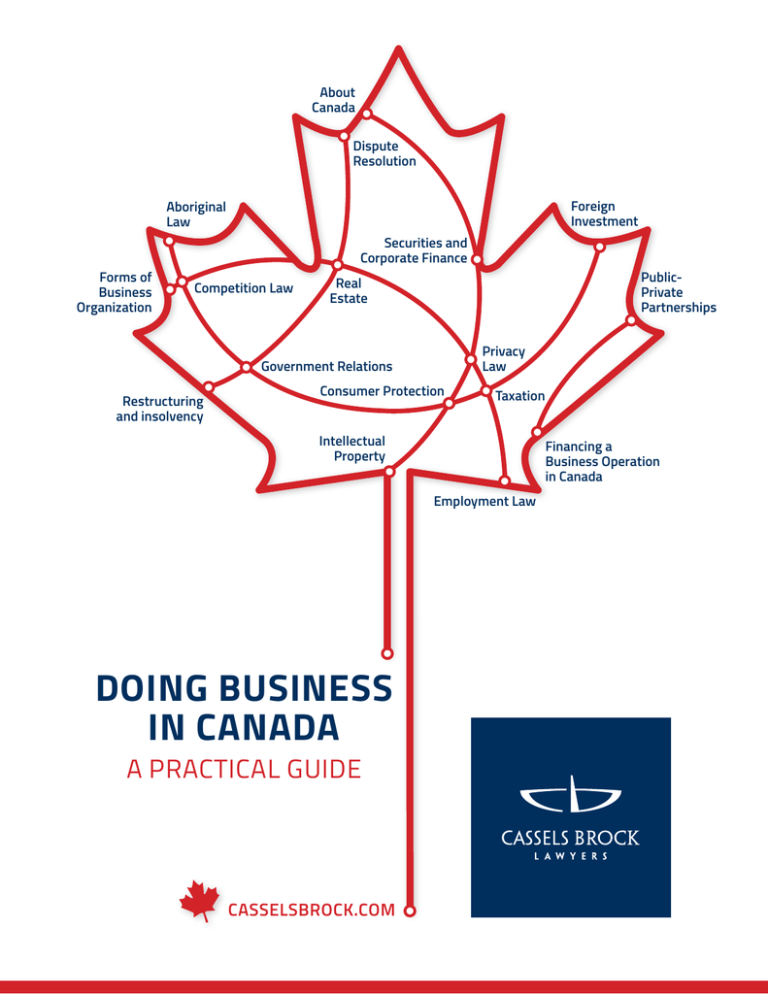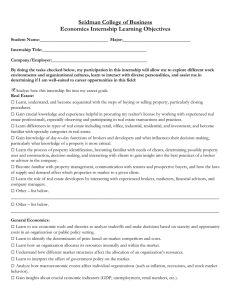about canada Dispute resolution
advertisement

About Canada Dispute Resolution Foreign Investment Aboriginal Law Securities and Corporate Finance Forms of Business Organization Competition Law Privacy Law Government Relations Restructuring and insolvency PublicPrivate Partnerships Real Estate Consumer Protection Taxation Intellectual Property Financing a Business Operation in Canada Employment Law Doing Business In Canada A Practical Guide casselsbrock.com Real Estate Investment Vehicles Acquisitions Real Estate Brokers Mortgage Brokers Financing Environmental Assessments Leasing Use and Development Taxation Proceeds of Crime Laws Governing the Acquisition, Use and Development of Real Estate The provinces and territories have primary responsibility for the acquisition, use and development of real property in Canada. With the exception of the province of Québec — where property law is governed by the Civil Code of Québec — property law in each jurisdiction has developed through the common law. Each jurisdiction has its own system for registering interests in real property. Interests are usually held in fee simple (absolute ownership for an indefinite duration) or as leasehold interests (tenure for a fixed period of time). Natural persons — other than those with a legal disability but including non-residents as well as Canadian residents and citizens — may acquire, hold and dispose of real property; however, provinces may impose restrictions and conditions in relation to the ownership of real property by non-residents. For instance, non-resident corporations holding real property in Ontario require an extra-provincial corporation licence. In addition, some provinces have imposed limits on acquisitions of agricultural land by non-residents. Investment Vehicles Several legal structures are available for investment in Canadian real estate including any one (or a combination) of the following: personal ownership; a corporation; a general or limited partnership; a condominium (whereby owners have title to their individual units and a proportionate interest in the condominium project’s “common elements”); co-ownership (known as a “joint venture” and usually structured as a tenancy in common whereby co-ownership is indivisible); or a trust. A Real Estate Investment Trust (“REIT”) is a kind of business trust whereby the capital from several investors is pooled together to invest in real estate. Each investor has an undivided beneficial Doing Business In Canada: Real Estate12.1 interest in — and is allocated a pro rata share of — the trust’s income and losses. REITs enjoy favourable tax treatment. Some REITs, other trusts, limited partnerships, corporations or individual property owners may establish a separate legal entity (usually a single-purpose corporation) that holds title to the real property as a “nominee” for the beneficial owner(s). While the property belongs to the beneficial owner, the nominee relationship may, for instance, facilitate a corporate reorganization or ensure the confidentiality of the beneficial owner’s identity. Acquisitions The first document in a real estate acquisition usually is a written agreement between the buyer and seller known as an Agreement of Purchase and Sale (“APS”). The APS sets out the terms for the transaction as well as the parties’ warranties and representations. Once the parties have signed the APS, usually the buyer (through counsel) conducts the due diligence (i.e., title and zoning searches). Commonly, an engineering review of environmental and physical matters is conducted. A title insurance policy — more often than a solicitor’s title opinion — is obtained to indemnify the insured’s actual loss and to pay legal defence (and related) costs and expenses should a claim threaten the insured’s title or mortgage. Where either party breaches their obligations under the APS, the other party may seek redress under the APS and/or at common law. Real Estate Brokers Parties looking to acquire or dispose of real estate usually hire a real estate broker to assist them. Real estate brokers are subject to provincial legislation designed to protect consumers. They are paid a commission for their services based on a percentage of the purchase price. The Real Estate Council of Ontario regulates trade in real estate in Ontario and administers the Real Estate and Business Brokers Act, 2002. Mortgage Brokers Mortgage brokers, lenders and administrators are subject to provincial regulation. In Ontario, the Mortgage Brokers, Lenders and Administrators Act requires mortgage brokers, administrators, brokers and agents to obtain a license to do business in the province. Financing Real estate financing usually is arranged through a bank, trust company, pension fund, credit union or insurance company. Various combinations of interest rates and terms are available depending on the institution involved, the nature of the transaction and the inherent risks. Lending institutions commonly take primary (i.e., a mortgage) and collateral (i.e., a general assignment of rents) security in real property and related assets to secure the loan. An indemnifier or guarantor may also be required. Foreign lenders may be subject to withholding (and other) taxes on the interest paid to them under the loan agreement. Environmental Assessments Environmental laws at both the federal and provincial levels set out the duties of landowners for the storage, discharge and disposal of contaminants and other hazardous materials in connection with real property. Liability for environmental damage runs with the land which means that a future owner may inherit the liability of a previous owner. An assessment of environmental risks should be made before a property is purchased. Commercial lenders customarily require the completion of an environmental assessment before funds are advanced. 12.2 Doing Business In Canada: Real Estate Leasing Real property may be purchased or leased. A long-term ground and building lease permits a tenant to lease vacant land and develop it for subletting to retail, office or other industrial subtenants. Most commercial office and retail space (and standard industrial space) in Canada is only available under a commercial lease and typically on a net/net rental basis. This means that the tenant pays basic rent plus a proportionate share of realty taxes and other maintenance charges. A retail lease may also require the tenant to pay rent based on a percentage of the tenant’s annual sales. The parties to a commercial lease rely on specific provincial legislation that governs the landlordtenant relationship, along with the common law, to enforce their respective rights and obligations under the lease. Provincial legislation that regulates residential leases may override the terms of the parties’ lease agreement and, in some cases, regulates residential rent increases by the landlord. In Ontario, legislation also limits the landlord’s ability to evict existing residential tenants and permits rent reductions in certain circumstances. Use and Development The use and development of real property are provincially regulated, primarily at the municipal level — and mostly in the form of official plans, as well as zoning and building by-laws. Development charges on new developments are common as are restrictions on (and regulation of) an owner’s ability to subdivide its property. Major energy and other developments on Aboriginal lands are subject to unique regulatory requirements including Aboriginal consultation and negotiation. Building codes set specific standards for new construction and regulate the maintenance of existing buildings. Obtaining building permits and all regulatory clearances is a typical preconstruction requirement. The municipalities of most provinces have adopted (in whole or in part) the National Building Code of Canada. Taxation Land transfer tax is imposed at graduated rates (based on the value of the consideration paid) on the transfer of real estate in some provinces. It may be imposed at both the provincial and municipal levels, and is generally paid by the buyer. For the sale of commercial and new residential buildings, the seller must collect goods and services tax (“GST”) — or Harmonized Sales Tax (“HST”) in certain provinces — as well as provincial sales tax (“PST”) for property located in the province of Québec. GST (or HST) is also imposed on rent payable under a commercial lease but not on rent paid under a residential lease. If certain goods (i.e., furniture or appliances) are included in the purchase of real property, PST is payable (where applicable) on such goods. Municipal taxes are payable by property owners annually based on the market value of their property. Income taxes are generally payable by Canadian residents and non-residents on the profits or gains (whether treated as capital gains or business income) from the disposition of land. If the seller is a non-resident, the buyer must withhold a percentage of the proceeds of sale unless the seller has obtained a clearance certificate from the tax authorities. Proceeds of Crime The federal Proceeds of Crime (Money Laundering) and Terrorist Financing Act (“the Act”) provides requirements for real estate developers and others to report suspicious transactions and large cash transactions. The Act also imposes other ongoing obligations including the development of a compliance regime and maintenance of certain records. Doing Business In Canada: Real Estate12.3 About Canada Dispute Resolution Foreign Investment Aboriginal Law About Cassels Brock »» Canadian law firm of more than 200 lawyers based in Toronto and Vancouver focused on serving the transaction, advocacy and advisory needs of the country’s most dynamic business sectors »» Emphasis on core practice areas of mergers and acquisitions, securities, finance, corporate and commercial law, taxation, intellectual property and information technology, international business and government relations Securities and Corporate Finance Forms of Business Organization Competition Law Restructuring and insolvency Consumer Protection casselsbrock.com/DBIC Financing a Business Operation in Canada Employment Law »» Cited as market leaders by Chambers Global, ALM 500, Best Lawyers, Lexpert, Global Counsel and others »» Serving leadership roles in business, political, civic, charitable and cultural organizations in community, national and international organizations Taxation Intellectual Property »» Consistently ranked at or near the top of Bloomberg, Thomson Financial and MergerMarket deals league tables for mergers and acquisitions and equity offerings »» Dedicated to staying on the leading edge of trends in law and business to offer timely proactive and preventative advice that adds demonstrable value Privacy Law Government Relations »» One of the largest business law practices in Canada, serving multinational, national and mid-market entities »» Regularly act on deals honored at the Canadian Dealmakers’ Gala and for counsel recognized at the Canadian General Counsel Awards PublicPrivate Partnerships Real Estate Doing Business In Canada A Practical Guide casselsbrock.com






